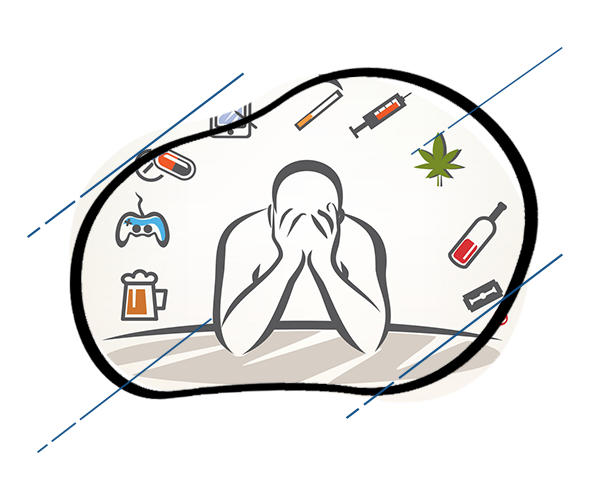De-Addiction
De-Addiction
Dr. Niket Kasar’s Clinic: De-addiction Center in Pune
Dr. Niket Kasar’s Clinic is a psychiatric hospital & De-addiction Center in Pune. Providing the highest level of psychiatric care for over 14 years in Pune. This clinic provides the best treatment for addiction. This is one of the best De-addiction Center in Pune. The Clinic has the expertise and experience to deal with a wide range of psychiatric conditions from mild depression to psychosis.

What is an Addiction?
Addiction is the fact or condition of being addicted to a particular substance or activity. It being abnormally tolerant to and dependent on something that is psychologically or physically habit-forming (especially alcohol or narcotic drugs). An addicted person is a person who cannot stop doing or be using something, especially something harmful.
Most Common Types of Addiction:
1) Alcohol & Drugs Addiction(like Nicotine, Smoking, Ganja addiction).
2) Internet & Pornography Addiction(like Facebook, WhatsApp, TV, Mobile, Video game addiction).
3) Sex Addiction.
4) Gambling Addiction.
5) Shopping Addiction.
6) Eating Disorder.
Alcohol use disorders refer to excessive drinking behaviors. It can create dangerous conditions for an individual and others. Alcohol dependence is the medical term for alcoholism. In medical science, it is the Medical illness that is caused by definitive structural change and neurotransmitter abnormality in the brain induced by alcohol.
Peer pressure.
Curiosity about the effect.
Media influence, Modeling.
Easy access (often at home).
Cultural / sociological traditions.
Makes one feel good, self-medication.
Behavioral or Psychiatric problem.
Children of alcoholic parents have a greater risk than others to develop dependence.
- Withdrawal symptoms when you tried to stop drinking. These symptoms include tremors, anxiety, irritability, racing heart, nausea, sweating, trouble sleeping, and seizures.
- Have little or no control over the amount you drink, when you drink, or how often you drink.
- Tried to limit or stop your drinking but found you couldn’t.
- Have had one or more occasions when you put yourself in a dangerous situation such as driving, swimming, and unsafe sex while drinking.
- Have become tolerant to the effects of drinking and require more alcohol to become intoxicated.
- If you have continued to drink despite having memory blackouts after drinking. Having frequent hangovers that cause you to miss work and other normal activities.
- If you have continued to drink despite having a medical condition that you know is worsened by alcohol consumption.
- Have continued to drink despite knowing it is causing problems at home, school, or work.
- Drink alone or start your drinking early in the day.
Treatment options include
Medical Management.
Occupational Stability.
Self Help Group.
Family support and supervision.
De-addiction Center in Pune.
